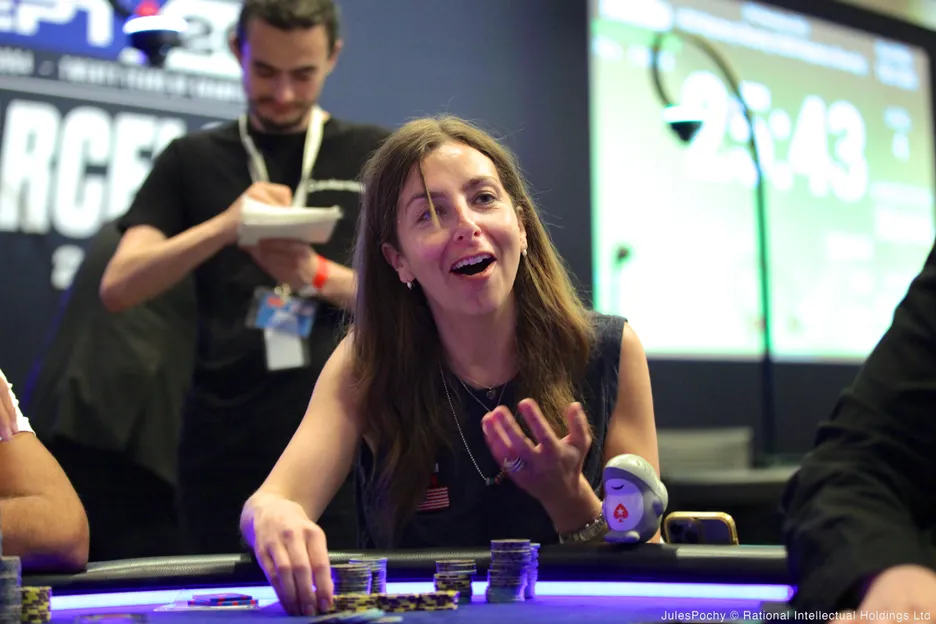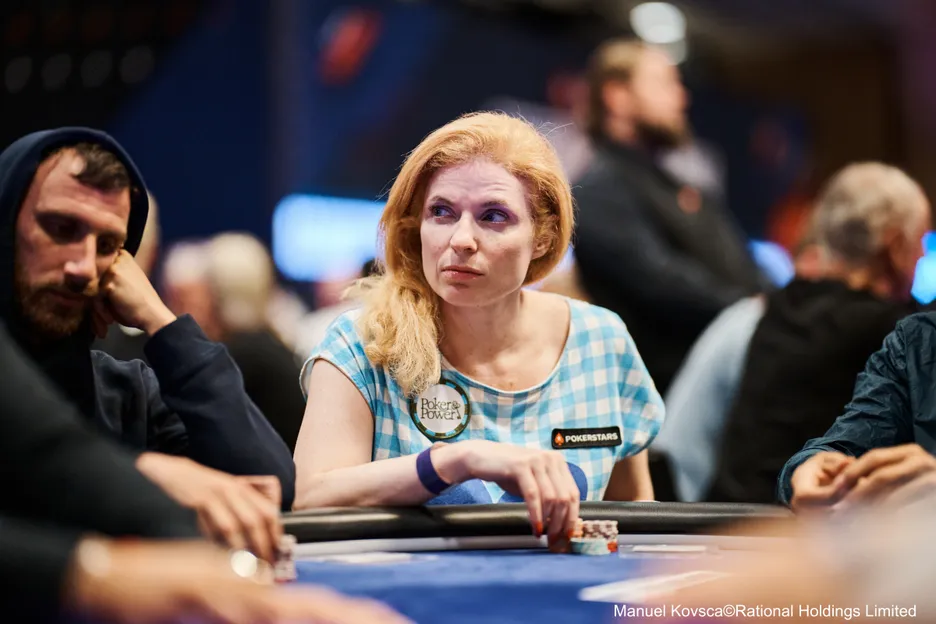Is poker a tool for learning in the classroom? Can it teach students about probability and risk in a way that prepares them for real-world problems and uncertainty?
PokerOrg caught up with PokerStars Ambassadors Maria Konnikova and Jennifer Shahade at EPT Barcelona to dig deeper into the question. We also sat down with veteran teacher and poker player Sarah Stefan to get her perspective. Stefan ran a Game Theory Club for the first time last year and the results were intriguing.
'An amazing educational tool'
The pushback from parents and administrators might be obvious — gambling doesn't belong in a school setting. But poker isn't gambling, Konnikova would argue. It's a great way to practice a wide range of everyday skills in a near-perfect learning environment.
“It's an amazing educational tool for teaching concepts that the human brain is learning — like probabilities, probabilistic thinking, uncertainty, and being comfortable with uncertainty,” Konnikova says. “And it just so happens that not only is this mathematical stuff, but it's how to think in probabilities, which I think is crucial for making good decisions.”
Most American students are exposed to gathering and interpreting statistics at an early age, but state education standards don't often address probability until the middle grades. Students in middle school (ages 12-14) learn to draw inferences while developing and using simple probability models to prepare them for interpreting quantitative data and conditional probability in high school. But it's a difficult thing to teach in a way that students will understand and apply to their own lives.
State standards are just a road map, and teachers need to find ways to differentiate these concepts for students of varying abilities and accommodate their needs. Konnikova says poker presents an opportunity to learn these concepts in an applied setting.
“It can be much easier to learn because games in general are a really great teaching tool, because people are motivated.”
And it’s not just for older students, she says. Poker is an educational tool that can be applied to all ages.
“It's actually stuff that's really good for children and young adults to learn as human beings, because being comfortable with uncertainty is huge in terms of dealing with shades of gray — which is the world — and realizing that everything is probabilistic, right? It's not black and white. Everything is uncertain. To be able to exist in that, being able to learn to manage your emotions, those types of skills are really well taught at a poker table.”
Game Theory Club
Sarah Stefan, a veteran poker player with 20 years of experience teaching in the Chicago Public School system, supports the idea of poker in the classroom. She ran a Game Theory Club for her middle school students last year that used poker as a primary vehicle for exploring the topic.
“It was fascinating,” Stefan says. “It was the first time we tried it and we had no idea what to expect.”
The club had 12 students and a wide range of archetypes.
“You had the kids who wanted to just be aggressive. They wanted to be in every pot, and they wanted to win every pot. And there were the kids who were timid, who were passive, who were afraid to enter the pot. And I'm not really surprised, but it did kind of narrow on gender lines.”
Boys wanted to bluff a lot, Stefan says, while girls didn’t want to bet unless they had a great hand. It was anecdotal, and Stefan did not gather data, but it did offer insight into her students.
“To me, what mattered was seeing the most timid, quiet girl. She said not two words for the first four weeks, but by the end she was going for it. Not often, but she was putting herself out there — she was playing hands aggressively and she was betting. She bluffed once or twice and you could just see the confidence build in her that she didn't know she had.”
The social-emotional development is something that poker brings about organically, Stefan says.
“I've been a teacher for 20 years and kids suck at losing, they hate it. Poker levels the playing field in that way because even the kids who are the best at poker are going to lose. And the kids who are not good are going to win some hands. So it allows both sides to get that feeling.”
'Poker is not gambling'
What about the natural pushback from parents and others who may not be familiar with poker, or its reputation as a gambling game?
Stefan says poker’s reputation as a gambling game is “completely ridiculous... I think the pushback obviously comes from, like, ‘You're teaching gambling, people are going to get addicted.’ Poker has these negative connotations, but stripped down is just a strategy game. Your chips are your game pieces. It's the same as Monopoly, the same as chess, the same as Rummy. It's the same as anything: the goal is to win, whether you're playing for a prize or not.”
“Poker is not gambling,” Konnikova says. “Sports betting is gambling. Poker is a skill game. You're playing against other people. You're not playing against bookies or the house or something else and things outside of your control. You're in an environment where you're actually making decisions and playing other individuals.”
Konnikova says an educational approach can protect against problem gambling tendencies later in life. “And when people push back and say, ‘Oh, but you're creating gamblers,’ — actually no, because problem gamblers come from people not understanding probabilities.
“If, from a young age, you actually understand it as this kind of mathematical, psychological game of skill, then you understand how to play it correctly and it becomes a skill game as opposed to something that's, like, ‘Oh, let's go gamble now.’”
Adult education, too
PokerStars Ambassador and chess player Jennifer Shadade has experience in those areas where skill games and gambling collide. Chess is a skill game that sometimes involves a friendly wager.
“I think that the math of poker can teach some extremely important lessons to anyone about probability and risk,” Shahade says. “That said, I think the fact that it involves money is both good for learning, because it can teach you lessons about finance, but also it could be bad because there are responsibility issues that can be a problem for any age, let alone for children.”
For Shahade, it’s still a game for grownups, but more research is needed that is focused specifically on how children interact with poker. Most research focuses on other types of gambling, and it’s difficult to conduct studies with younger age groups due to privacy restrictions.
“I actually think one of the great things about poker is that it's a game for adults. Because I think that it allows for the game to be something that you learn later in life, you know, and enhance your education,” Shahade says. “I'd like to see more focus on poker as an adult education tool, especially for people who missed out on financial lessons in their earlier life. It's been really valuable to me for that.”
'You actually need good instructors'
While poker might overcome the gambling stigma, its application in schools will still hinge on the teacher’s approach and the school environment. Should it exist as a club or can it be built into the curriculum? How do you remove the gambling stigma from the game while maintaining its core mechanics?
“I think as an extracurricular (club) there's certainly a place for that,” Konnikova says. “We have chess clubs. Why not do the same thing? But I actually also think that it could help to have it as part of your math class or something like that, because that exists at a higher level. There are classes at Harvard and MIT that teach poker. I've lectured at them.”
Konnikova also stresses the importance of a teacher who understands the topic.
“I'm not going to name any names, but there are poker organizations that have instructors that don't know what the f**k they're doing. I have seen them try to explain poker to novice players and it's just a train wreck.”
For Konnikova, it’s “disastrous” if a teacher doesn’t understand poker at a high enough level to teach it.
“Then you create a bunch of baby gamblers because they don't understand anything. You need good instructors.”
Stefan says that teachers, parents, and administrators have to be open-minded.
“You have to be able to buy into the idea that poker isn't gambling, poker is a strategy game. And if you're able to move past the misconceptions of the game and really strip it down to its core, that's who we're looking for, people who are able to put their preconceived notions aside. And I think it'll be all about the training, right? It'll be all about poker and what skills it can teach you.”



